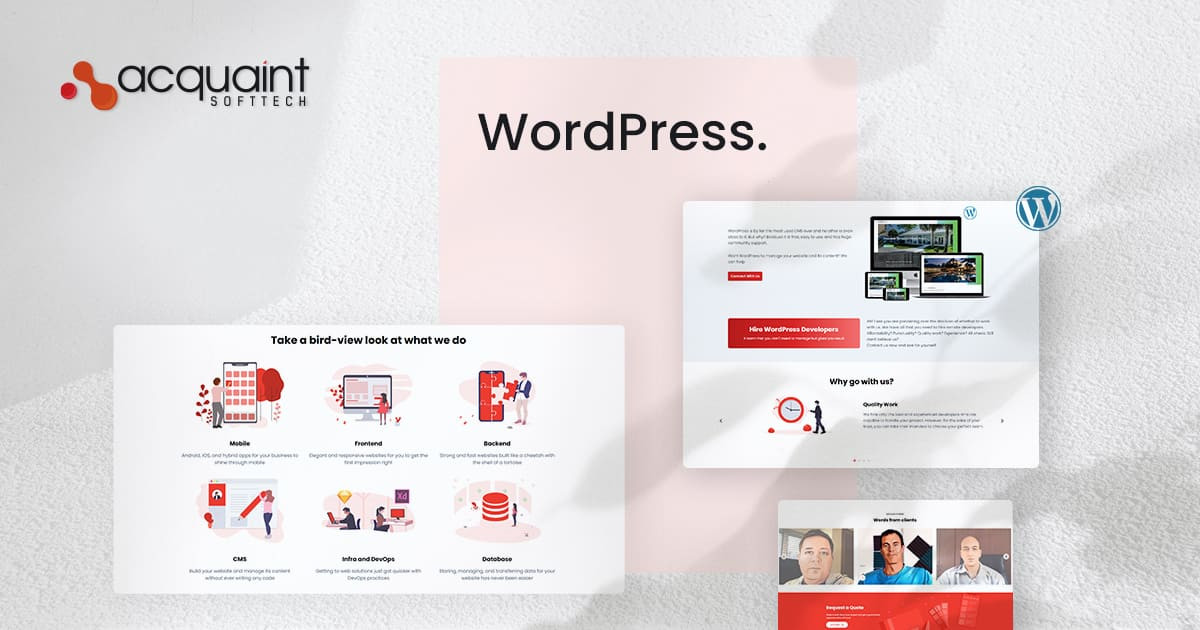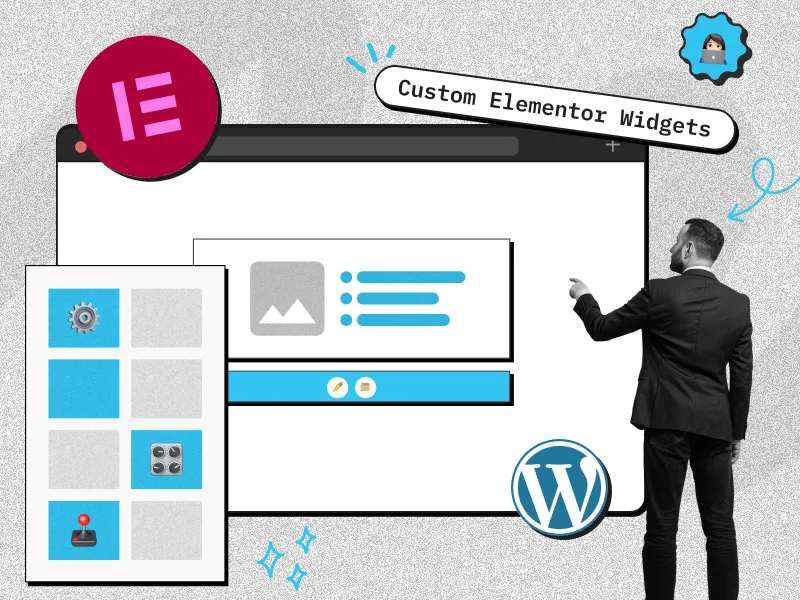How to Build a Mobile-First WordPress Website That Converts
In today's digital landscape, more than 60% of web traffic comes from mobile devices. If your WordPress website isn’t optimized for smartphones and tablets, you’re missing out on potential leads, conversions, and revenue. That’s why a mobile-first design is no longer optional—it’s essential.
In this article, we’ll walk you through how to build a mobile-first WordPress website that not only looks great but also drives results.
Why Mobile-First Design Matters
Mobile-first design means you start the design process with mobile users in mind, rather than trying to scale down a desktop layout. This approach prioritizes:
Fast load times
Touch-friendly navigation
Clear, focused content
Streamlined user journeys
Google also uses mobile-first indexing, meaning the mobile version of your website is the primary version used for ranking. A poor mobile experience can cost you both SEO rankings and conversions.
Step-by-Step: Build a Mobile-First WordPress Website That Converts
1. Start With a Responsive, Lightweight Theme
Choose a WordPress theme that is mobile-optimized out of the box. Look for features like:
Mobile-friendly layouts
Speed optimization
Clean, minimal code
Support for page builders like Elementor or Gutenberg
Recommended themes: Astra, GeneratePress, Hello Elementor
2. Prioritize Speed and Performance
Mobile users are impatient. Even a 1-second delay can reduce conversions. Here’s how to optimize:
Use caching plugins like WP Rocket or LiteSpeed Cache
Compress images with Smush or ShortPixel
Minify CSS, JavaScript, and HTML
Use a CDN like Cloudflare
3. Design for Thumbs, Not Cursors
Mobile users navigate with their thumbs—design accordingly:
Use large, tappable buttons
Avoid crowded layouts
Keep menus simple and collapsible
Place CTAs in easily accessible areas
4. Streamline Your Content
Clutter kills conversions—especially on mobile. Stick to:
Short headlines and scannable paragraphs
Bullet points for easy readability
One clear CTA per page
Eliminate non-essential elements
5. Optimize Forms for Mobile
Conversion often depends on a simple form. Keep these tips in mind:
Use fewer fields (name, email, phone max)
Enable autofill and input masks
Use mobile-friendly drop-downs and checkboxes
Test on real devices to ensure usability
6. Test, Analyze, and Improve
Use tools like:
Google PageSpeed Insights – Check mobile performance
Hotjar or Microsoft Clarity – See where users tap and scroll
Google Analytics – Track conversions and bounce rates by device
BrowserStack or Responsively App – Test across multiple mobile devices
Bonus: Mobile SEO Tips
Use structured data for better indexing
Avoid intrusive pop-ups
Set viewport meta tags correctly
Optimize titles and meta descriptions for smaller screens
Final Thoughts
A mobile-first WordPress website isn’t just a “nice-to-have”—it’s the key to delivering better UX, higher engagement, and more conversions. By choosing the right tools, designing intentionally for smaller screens, and continuously testing and improving, you’ll build a website that works for users and search engines alike.
Read more - https://www.janbaskdigitaldesign.com/wordpress-website-design-and-development
In today's digital landscape, more than 60% of web traffic comes from mobile devices. If your WordPress website isn’t optimized for smartphones and tablets, you’re missing out on potential leads, conversions, and revenue. That’s why a mobile-first design is no longer optional—it’s essential.
In this article, we’ll walk you through how to build a mobile-first WordPress website that not only looks great but also drives results.
Why Mobile-First Design Matters
Mobile-first design means you start the design process with mobile users in mind, rather than trying to scale down a desktop layout. This approach prioritizes:
Fast load times
Touch-friendly navigation
Clear, focused content
Streamlined user journeys
Google also uses mobile-first indexing, meaning the mobile version of your website is the primary version used for ranking. A poor mobile experience can cost you both SEO rankings and conversions.
Step-by-Step: Build a Mobile-First WordPress Website That Converts
1. Start With a Responsive, Lightweight Theme
Choose a WordPress theme that is mobile-optimized out of the box. Look for features like:
Mobile-friendly layouts
Speed optimization
Clean, minimal code
Support for page builders like Elementor or Gutenberg
Recommended themes: Astra, GeneratePress, Hello Elementor
2. Prioritize Speed and Performance
Mobile users are impatient. Even a 1-second delay can reduce conversions. Here’s how to optimize:
Use caching plugins like WP Rocket or LiteSpeed Cache
Compress images with Smush or ShortPixel
Minify CSS, JavaScript, and HTML
Use a CDN like Cloudflare
3. Design for Thumbs, Not Cursors
Mobile users navigate with their thumbs—design accordingly:
Use large, tappable buttons
Avoid crowded layouts
Keep menus simple and collapsible
Place CTAs in easily accessible areas
4. Streamline Your Content
Clutter kills conversions—especially on mobile. Stick to:
Short headlines and scannable paragraphs
Bullet points for easy readability
One clear CTA per page
Eliminate non-essential elements
5. Optimize Forms for Mobile
Conversion often depends on a simple form. Keep these tips in mind:
Use fewer fields (name, email, phone max)
Enable autofill and input masks
Use mobile-friendly drop-downs and checkboxes
Test on real devices to ensure usability
6. Test, Analyze, and Improve
Use tools like:
Google PageSpeed Insights – Check mobile performance
Hotjar or Microsoft Clarity – See where users tap and scroll
Google Analytics – Track conversions and bounce rates by device
BrowserStack or Responsively App – Test across multiple mobile devices
Bonus: Mobile SEO Tips
Use structured data for better indexing
Avoid intrusive pop-ups
Set viewport meta tags correctly
Optimize titles and meta descriptions for smaller screens
Final Thoughts
A mobile-first WordPress website isn’t just a “nice-to-have”—it’s the key to delivering better UX, higher engagement, and more conversions. By choosing the right tools, designing intentionally for smaller screens, and continuously testing and improving, you’ll build a website that works for users and search engines alike.
Read more - https://www.janbaskdigitaldesign.com/wordpress-website-design-and-development
How to Build a Mobile-First WordPress Website That Converts
In today's digital landscape, more than 60% of web traffic comes from mobile devices. If your WordPress website isn’t optimized for smartphones and tablets, you’re missing out on potential leads, conversions, and revenue. That’s why a mobile-first design is no longer optional—it’s essential.
In this article, we’ll walk you through how to build a mobile-first WordPress website that not only looks great but also drives results.
Why Mobile-First Design Matters
Mobile-first design means you start the design process with mobile users in mind, rather than trying to scale down a desktop layout. This approach prioritizes:
Fast load times
Touch-friendly navigation
Clear, focused content
Streamlined user journeys
Google also uses mobile-first indexing, meaning the mobile version of your website is the primary version used for ranking. A poor mobile experience can cost you both SEO rankings and conversions.
Step-by-Step: Build a Mobile-First WordPress Website That Converts
1. Start With a Responsive, Lightweight Theme
Choose a WordPress theme that is mobile-optimized out of the box. Look for features like:
Mobile-friendly layouts
Speed optimization
Clean, minimal code
Support for page builders like Elementor or Gutenberg
Recommended themes: Astra, GeneratePress, Hello Elementor
2. Prioritize Speed and Performance
Mobile users are impatient. Even a 1-second delay can reduce conversions. Here’s how to optimize:
Use caching plugins like WP Rocket or LiteSpeed Cache
Compress images with Smush or ShortPixel
Minify CSS, JavaScript, and HTML
Use a CDN like Cloudflare
3. Design for Thumbs, Not Cursors
Mobile users navigate with their thumbs—design accordingly:
Use large, tappable buttons
Avoid crowded layouts
Keep menus simple and collapsible
Place CTAs in easily accessible areas
4. Streamline Your Content
Clutter kills conversions—especially on mobile. Stick to:
Short headlines and scannable paragraphs
Bullet points for easy readability
One clear CTA per page
Eliminate non-essential elements
5. Optimize Forms for Mobile
Conversion often depends on a simple form. Keep these tips in mind:
Use fewer fields (name, email, phone max)
Enable autofill and input masks
Use mobile-friendly drop-downs and checkboxes
Test on real devices to ensure usability
6. Test, Analyze, and Improve
Use tools like:
Google PageSpeed Insights – Check mobile performance
Hotjar or Microsoft Clarity – See where users tap and scroll
Google Analytics – Track conversions and bounce rates by device
BrowserStack or Responsively App – Test across multiple mobile devices
Bonus: Mobile SEO Tips
Use structured data for better indexing
Avoid intrusive pop-ups
Set viewport meta tags correctly
Optimize titles and meta descriptions for smaller screens
Final Thoughts
A mobile-first WordPress website isn’t just a “nice-to-have”—it’s the key to delivering better UX, higher engagement, and more conversions. By choosing the right tools, designing intentionally for smaller screens, and continuously testing and improving, you’ll build a website that works for users and search engines alike.
Read more - https://www.janbaskdigitaldesign.com/wordpress-website-design-and-development
0 Comments
·0 Shares
·81 Views
·0 Reviews







